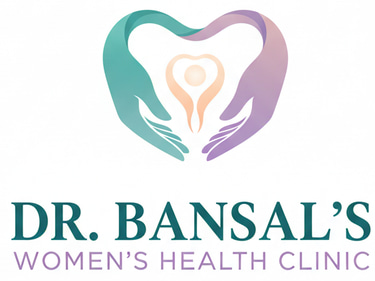Polycystic Ovary Syndrome (PCOS / PCOD) Treatment in Indore
Dr Bansal's Women's Health Clinic
About PCOS / PCOD
PCOS, commonly known as PCOD, is one of the most prevalent endocrine disorders among women of childbearing age. Characterised by an abnormal secretion of androgens or male hormones by the ovaries, it results in irregular menstrual flow, formation of cysts in the ovaries, and difficulty in ovulation.
PCOS is both a lifestyle and a hormone-related disorder that can affect fertility, metabolism, and overall health.
Causes of PCOS / PCOD
Although the cause is not known, several factors contribute to its development:
Hormonal Imbalance: Increased levels of androgens, or male hormones, and insulin resistance.
Genetic Factors: Family history of either PCOS or diabetes is a risk factor.
Insulin Resistance: High levels of insulin may stimulate androgen production, leading to worsening symptoms.
Lifestyle Factors: Poor diet, lack of exercise, stress, and weight gain can trigger or worsen PCOS.
Common Symptoms
Irregular or missed periods
Hirsutism (excessive facial or body hair)
Acne or oily skin
Weight gain, particularly around the abdomen
Hair thinning or hair loss on the scalp
Difficulty conceiving (infertility)
Mood swings or fatigue
Prevention & Lifestyle Management
Although PCOS cannot be fully prevented, as it is caused by genetic and hormonal problems, it can be managed and controlled by healthy lifestyle modifications:
1. Balanced Diet
Include more fruits, vegetables, whole grains, and lean proteins.
Reduce refined carbohydrates, sugary foods, and processed snacks.
Eat foods with a low glycemic index to keep your blood sugar levels stable.
2. Regular Exercise
Engage in at least 30 minutes of moderate physical activity, such as walking, yoga, or cycling, most days of the week.
Exercise helps reduce insulin resistance and manage weight.
3. Healthy Weight
Even a weight loss of 5–10% can significantly improve menstrual regularity and enhance fertility.
4. Stress Management
Practice yoga, meditation, or breathing exercises to help lower cortisol levels and maintain better hormonal balance.
5. Regular Medical Check-ups
Regularly monitor blood sugar, cholesterol, and hormone levels.
Specialised treatment by a gynaecologist/endocrinologist is advised.
Treatment Options
Lifestyle modification (diet + exercise)
Medications to regulate menstrual cycles and hormones
Fertility treatments are used if conception is difficult. Optional holistic approach: Homoeopathic/Ayurvedic support for natural hormonal balance
Wellness
Empowering women through holistic health solutions.
Contact
Support
(+91) 8871751510
© 2025. All rights reserved.
